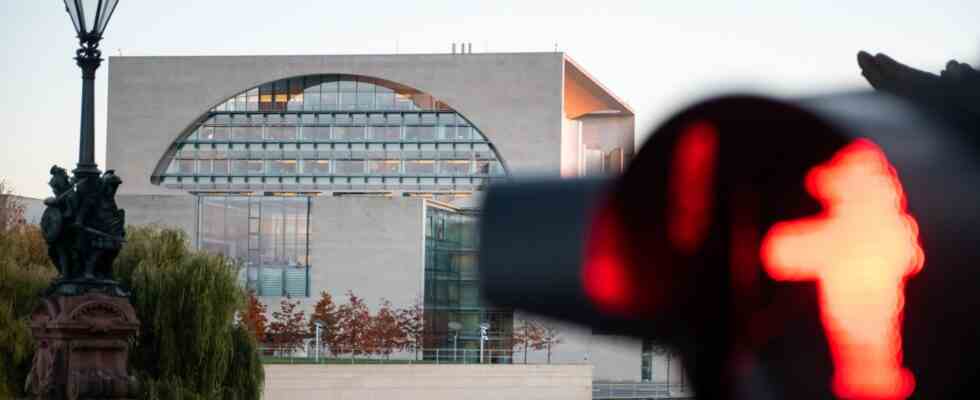Status: 06/22/2022 05:23 a.m
In view of the sharp rise in prices, the voices in the traffic light coalition are getting louder after further relief. Meanwhile, the FDP insists on a return to the debt brake. Today the coalition committee meets.
Finance Minister Christian Lindner from the FDP is saying it at almost every opportunity these days – for example yesterday at the BDI’s “Industry Day”: “What we have to achieve now is a return to the debt brake. Because otherwise we wouldn’t undercut our budgets get control.”
The debt brake allows the federal government only a very small amount of net borrowing. But due to Corona, the debt brake has been suspended for three years – which has enabled the federal government to take on record debt ever since. If Lindner and the FDP have their way, this has to stop next year. And the liberals are putting more pressure on their core issue the worse they do in the polls – as the smallest partner in the traffic light coalition.
Further relief required
At the same time, the voices of the SPD and Greens before today’s coalition committee are getting louder, in view of the high inflation, to bring further relief for the citizens on the way. For example, to increase the Hartz IV standard rates because of the price increases. SPD leader Lars Klingbeil emphasizes, “I think it’s absolutely clear that the standard rates have to be increased. Because prices are rising everywhere.” According to Klingbeil, the traffic light parties have shown in two coalition committees that they can find solutions that benefit the citizens.
The parliamentary group leader of the Greens, Britta Haßelmann, sees it very similarly. With regard to basic security, the coalition must come to an agreement. “People who suffer extremely and cannot compensate for this need more support,” says Hasselmann.
Criticism of the debt brake
More support means more government spending. And the debt brake is also coming under pressure. Greens leader Ricarda Lang has just emphasized that it shouldn’t be about complying with the debt brake no matter what. Rather, one must meet the challenges of the time.
The federal government has already decided on two relief packages – amounting to almost 30 billion euros. Some of it hasn’t even made it into people’s wallets yet. About the end of the EEG surcharge from July, 300 euros energy money for employed persons, 200 euros one-time payment for recipients of social benefits, 100 euros child bonus. Two measures, on the other hand, have been in effect for each month since the beginning of June: the tank discount and the nine-euro ticket.
Oliver Holtemöller from the Leibniz Institute for Economic Research in Halle rates both measures quite negatively – because the wrong people would also benefit from them: “Both the tank discount and the nine-euro ticket are very imprecise, unspecific instruments. They also have unfavorable distribution effects,” says Holtemöller. He sees many disadvantages but hardly any advantages. “It would be advisable not to lengthen these instruments under any circumstances. In fact, they should be discontinued immediately.”
“Someone has to bear these costs now”
But there is no question of that. Rather, the Greens are considering extending the nine-euro ticket, which would mean additional expenses. Conversely, there are also relief proposals that would reduce tax revenue. For example, lowering the VAT on certain foods, as the Greens are bringing into play. Or adjust income tax rates to inflation to counteract so-called cold progression. The FDP is pushing for it.
From the point of view of economist Holtemöller, it is now a matter of setting priorities. Further focused help is possible even if the debt brake is observed – if savings are made elsewhere. According to Holtemöller, it is now a matter of deciding on additional relief for certain sections of the population. “But that means that other parts have to bear a greater burden. The time when gifts were promised to all sections of the population is definitely over.” And the economist emphasizes: “German society has become poorer overall as a result of the increase in energy prices. Someone now has to bear these costs.”
No relief package III to be expected yet
In the run-up to the coalition committee, the governing parties said that the situation should first be assessed tonight and that no relief package III is yet to be expected. Because the budget for 2023 is already being drawn up in parallel. The draft budget is to be adopted in the Federal Cabinet on July 1 – if possible in compliance with the debt brake.
On July 4th, the federal government, business and the trade unions want to meet for the first time for the so-called concerted action. The aim is to explore what the state and the collective bargaining partners can do to prevent a wage-price spiral in view of the high inflation. A conceivable scenario: the trade unions practice wage restraint when the state cushions social hardship, which in turn would burden the federal budget.
This will be followed by budget deliberations in the Bundestag from September. In doing so, they want to specifically determine whether further relief measures will be incorporated into the budget. And how these can be financed in case of doubt. Whether the debt brake will apply again from 2023 should therefore only be decided in the autumn – also depending on how the economic situation will develop by then.

